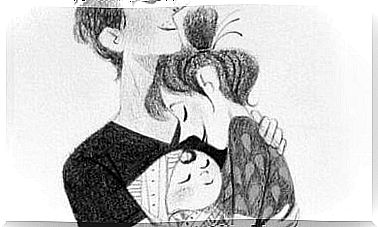Children’s Whining: Is It Real Or Just Manipulation?

Children’s whining appears as a way of channeling frustration in the face of a lack or impossibility to solve a problem. In children, this resource is used as a form of expression in situations of non-compliance.
However, children’s whining can also become a method of manipulation.
When the complaint is unfounded, it is important to correct this behavior in children. A “nagging” or “crying” child is prone to becoming a victimized adult, that is, a person who is convinced that nothing is happening in his favor. As a result, the child will not be able to solve their own problems.
Whining is a common behavior in children from 5 years of age onwards. From that age, the child will always use this resource to escape their responsibility. The difference will be in how the parents will channel their complaint.
the justified whining
Certainly, it is difficult for children to convey their emotions. This is due, in principle, to the fact that they lack the maturity and communication resources to do so. So that’s where the whining comes in, to let them know how she feels.
A justified whining is a claim with grounds, that is, one whose origin is real or solid. For example, an inconvenience due to physical discomfort or being upset due to bullying at school, among other valid reasons.
As a form of expression, whining helps them to convey a nonconformity. For parents, it is a powerful resource for knowing how their children feel about a situation. Well-channeled whining can create the space for a conversation between parents and children.

Whining as a method of manipulation
In the most common cases, whining takes on another purpose and becomes a way for the child to achieve something. Its constant use, accompanied by tantrums and screaming, serves to coerce parents into satisfying their whim to get what they want.
When the whining takes place under these circumstances, it does not have the foundations to validate a need. It then becomes a manipulative resource that many parents fall for to avoid conflict.
By nature, whining accompanies children from the age of 5 years. It is a way to face change, but also to measure its strength. Good education from an early age prevents whining from becoming a habit that extends into adulthood.
How to deal with the child who whimpers excessively?
An effective way to control children’s whining is to look at the source of this behavior. When there are no real or solid reasons to cry, it is best to ignore what they are asking for. Although there is no magic recipe to eliminate it, some recommendations can help :
- Address only one complaint. When a child whimpers as a form of manipulation, he may whimper over and over again. In general, the first complaint is the one that contains real discomfort.
- Search for the source. Why is the child whining? What is the reason? Are there real reasons to cry? These questions can help you see whining more objectively.

- Don’t give in to whining as manipulation. When the presence of an attempt at manipulation is perceived, it is necessary to avoid giving in to the request. As the child understands that he can get what he wants this way, the whining will increase rather than decrease.
- Ignore tantrums or complaints. If the whining is accompanied by tantrums, it is best to ignore the situation. What is indicated in these cases is to wait for the child to calm down to talk about their behavior.
The effects of whining on people
Some experts agree that whining has a negative effect on people’s brains. Being constantly exposed to complaints can numb your functioning; a minimum of 30 minutes is enough for the brain to decrease its functions.
Also, listening to constant complaints can be the cause of severe depression. It can also have effects such as low self-esteem, insecurity and inability to overcome. For these reasons, people who complain constantly are considered toxic people.
The same happens in the case of the little ones. Whimpering can cause conditions that impede their personal development and, later, their professional development.









